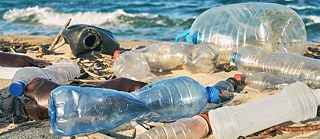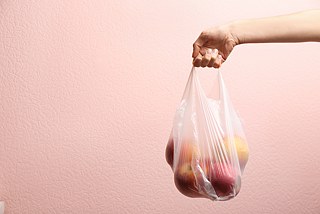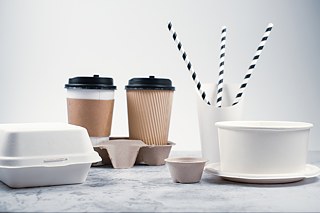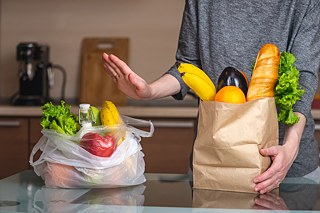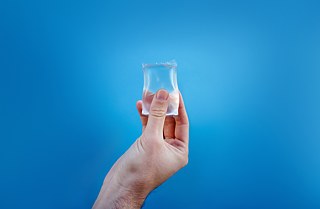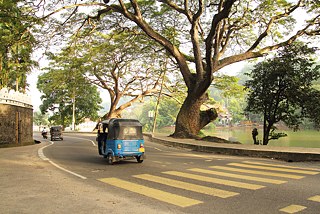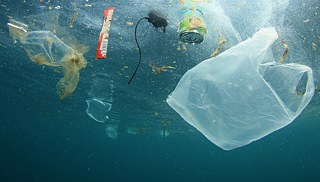Plastic bans, disposable dinnerware made of bioplastics, and streets made of plastic waste: countries, companies and private citizens are all pursuing initiatives that show what the world would be like without plastic.
By Johannes Zeller
Today, plastic used as cheap packaging material is so widespread it is hard to imagine everyday life without it. Unfortunately, the resulting mountains of plastic rubbish are just as everyday. According to the Federal Statistical Office, every German generates 37.4 kilograms of plastic waste a year, placing a huge burden on the environment. A PET bottle takes more than 500 years to degrade, releasing toxins into the groundwater as it does. Garbage also frequently ends up in the oceans where it forms huge islands of trash. The largest floating dump in the world is in the Pacific and at around 1.6 million square kilometres is about four times the size of Germany. Plastic is particularly durable and poses an acute threat to marine animals.
Rwanda, a Country Without Plastic
Rwanda, a country without plastic | Photo: © picture-alliance / Photoshot
Rwanda is an international pioneer in the fight against plastic waste. It has been illegal to import, sell or possess plastic bags since 2008, and offenders face high fines and imprisonment. The East African country also focuses on raising awareness of environmental protection through targeted media campaigns and by adding it to school curriculums. The last Saturday of every month is Umuganda Day, when citizens are encouraged to collect garbage from all over the country and plant new trees - as in this photo where foreign diplomats are working together with locals. Shops are closed for the day and even President Paul Kagame pitches in.
Preventing Waste With a 6 Cent Surcharge
Preventing waste with a 6 cent surcharge | Photo: © Adobe
A project in Great Britain has shown that plastic waste can be significantly reduced if consumers have to pay for shopping bags. In 2015, large supermarkets in Great Britain began charging five pence (six euro cents) per plastic bag. According to official estimates, consumption of plastic bags in the UK has fallen by more than 80 percent since then, saving the equivalent of around 65.6 million euros in waste disposal. Germany is seeing a similar shift, where the consumption of plastic bags has fallen by around 64 percent since 2015. A voluntary agreement between the government and retailers has been in force here since 2016 stipulating that most plastic bags are only available for purchase.
Bioplastics for Disposable Items
Bioplastics for disposable items | Photo: © Adobe
In this era of coffee to go, take always and food delivery services, disposable cutlery, dinnerware, straws and packaging are creating enormous amounts of plastic rubbish. More and more companies are therefore looking for ecological alternatives, and the European Union plans to ban single-use plastics as of 2021, at least for products where a biodegradable option is available. These alternative products are generally made of the bioplastic polylactic acid or PLA for short. It is seen as the green alternative to PET (polyethylene terephthalate). And while PLA is less resistant to heat, it is biodegradable and, unlike other plastics, doesn’t release toxic chemicals into the water table as it degrades.
Global Alliance Against Single-Use Plastic
Global alliance against single-use plastic | Photo: © Adobe
Corporations, governments and organizations have all signed on to the British Ellen MacArthur Foundation’s New Plastics Economy Global Commitment, joining a pact to avoid single-use plastics wherever possible. The Ellen MacArthur Foundation reports that the over 250 diverse signatories – which include Unilever, H&M, Coca-Cola and the Texas city of Austin -- represent around 20 percent of all plastic packaging manufacturers worldwide. They are committed to meeting solid targets by 2025 where progress is assessed every 18 months and the results released in a public statement.
Edible Water Bubbles Wrapped in Seaweed
Pungi comestibile cu apă, din iarbă de mare | Photo: © Notpla
Meanwhile scientists and start-ups are currently looking for additional alternatives to single-use plastic. The British Skipping Rocks Lab start-up has developed an alternative to PET bottles, offering edible bubbles of seaweed filled with water. Right now, the technology only works with small amounts of liquid, but the start-up is perfecting their idea and hopes to offer larger containers in future. Researchers at Halle-Wittenberg University have developed creamer packaging made of milk and sugar that simply dissolves in a cup of coffee or tea, and the Bio-Lutions start-up is making take-away packaging from biological waste, just to name a few examples of the solutions being developed.
Houses and Streets Made of Plastic Waste
Houses and streets made of plastic waste | Photo: © Adobe
Other companies and initiatives around the world are developing creative ideas for recycling plastic waste. The Indian K K Plastic Waste Management company, for example, has developed a technique for adding plastic waste to asphalt to make it longer lasting. According to the company, around 3,500 kilometres of roads with 10,000 tonnes of plastic have already been laid around Bangalore. The city of Rotterdam is also planning to try out the innovation. But plastic waste doesn’t just end up in roads: The Indian Rudra Environmental Solutions company processes it into fuel, and initiatives in Guatemala are building houses and schools from old PET bottles.
Clean Coasts for Plastic-Free Oceans
Clean coasts for plastic-free oceans | Photo: © Adobe
Studies estimate that between 13,000 and 35,000 tonnes of new plastic waste is dumped into the world’s oceans every day. Initiated by the US Ocean Conservancy, “International Coastal Cleanup” day takes place every year in September when volunteers in over 100 countries clean up coasts and shores. More than volunteers are involved as well: with backing from companies like Ikea, Dell and HP, the US NGO Lonely Whale hires people near the coast to collect plastic waste to keep it from making its way into the oceans, creating jobs at the same time.
